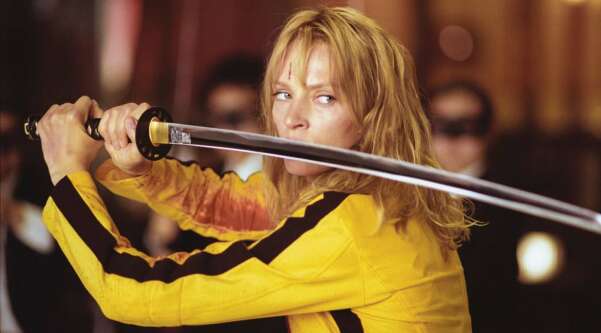
★★★★½
“Here Comes ‘The Bride’…”
 I don’t like Quentin Tarantino. In fact, every time I see his smug little face, I have to resist the urge to hit something. I do admire his talents as a scriptwriter, but think he needs someone else to rein in the pop-culture references and other self-indulgent excesses which pepper his work. That’s why I prefer From Dusk Till Dawn, Natural Born Killers and True Romance, and find Reservoir Dogs, and especially Pulp Fiction, very over-rated. I have no interest in hearing about the meaning of Madonna songs, or knowing what they call quarter-pounders in France. And don’t even get me started on his lack of ability as an actor…
I don’t like Quentin Tarantino. In fact, every time I see his smug little face, I have to resist the urge to hit something. I do admire his talents as a scriptwriter, but think he needs someone else to rein in the pop-culture references and other self-indulgent excesses which pepper his work. That’s why I prefer From Dusk Till Dawn, Natural Born Killers and True Romance, and find Reservoir Dogs, and especially Pulp Fiction, very over-rated. I have no interest in hearing about the meaning of Madonna songs, or knowing what they call quarter-pounders in France. And don’t even get me started on his lack of ability as an actor…
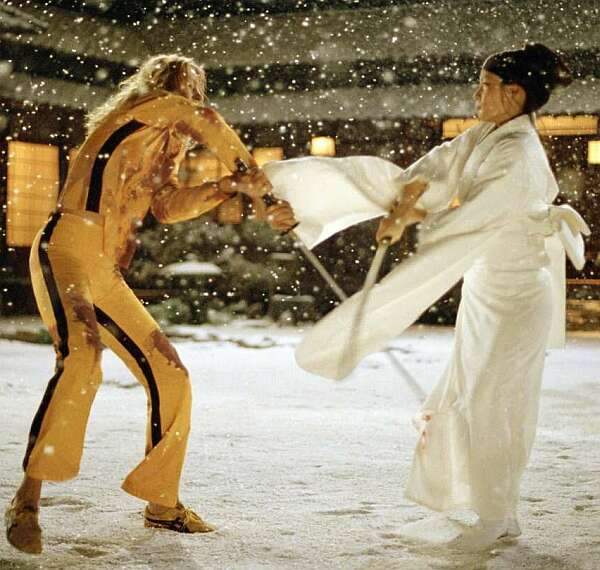 There is also the nasty question of how much of what is praiseworthy, is actually Quentin’s own work. If you’ve seen the infamous Who Do You Think You’re Fooling?, which intercuts clips from Reservoir Dogs with very similar scenes from a Hong Kong movie made several years previously, City on Fire, you’ll know what I mean. I’d rather praise film-makers such as David Cronenberg, who do more than cobble together pieces “borrowed” from other people, no matter how amusingly post-modern the results may be.
There is also the nasty question of how much of what is praiseworthy, is actually Quentin’s own work. If you’ve seen the infamous Who Do You Think You’re Fooling?, which intercuts clips from Reservoir Dogs with very similar scenes from a Hong Kong movie made several years previously, City on Fire, you’ll know what I mean. I’d rather praise film-makers such as David Cronenberg, who do more than cobble together pieces “borrowed” from other people, no matter how amusingly post-modern the results may be.
I say this, so you know I am no drooling fanboy, and am probably inclined to be more critical than most. But I have to say, the first part of Kill Bill is almost entirely satisfactory, recovering after a shaky start. When it opened with a quote from Star Trek (of questionable relevance), I feared this was a Kevin Smith movie, rather than the brutal action pic I wanted. But such tendencies were largely kept under control, perhaps because there wasn’t much dialogue in which to work smug references.
Instead, it’s the soundtrack which slides into self-indulgence. You can tell Tarantino grew up in the 70’s: he has rifled his CD collection yet again, mixing everything from the theme to The Green Hornet to spaghetti western music, with the overall effect leaden-footed and rarely more than painfully obvious. Yet there are more than enough wonderful moments to compensate for the odd bit of weakness.
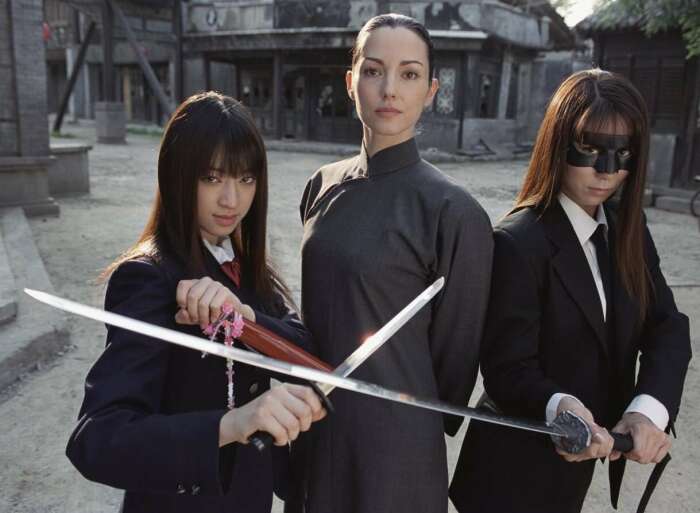 Uma Thurman is The Bride – her character is never named (it’s given a couple of times, but beeped out) – a member of the Deadly Vipers Assassination squad operating under the eye of Bill (David Carradine, not yet seen). When she tries to quit, her marriage is interrupted by the rest of the team, who kill the groom, the priest and even the guy playing the organ. They think they’ve killed the pregnant bride. They’re wrong.
Uma Thurman is The Bride – her character is never named (it’s given a couple of times, but beeped out) – a member of the Deadly Vipers Assassination squad operating under the eye of Bill (David Carradine, not yet seen). When she tries to quit, her marriage is interrupted by the rest of the team, who kill the groom, the priest and even the guy playing the organ. They think they’ve killed the pregnant bride. They’re wrong.
Four years later, she wakes up in a hospital bed, with her child not to be seen. And, boy, is The Bride pissed. She vows to kill her four former colleagues, plus Bill. Volume One covers her awakening, plus the first two-fifths of her mission: Vernita Green (Vivica A. Fox), now a housewife and mother, plus O-Ren Ishii (Lucy Liu), now head of the Tokyo underworld.
She actually goes after O-Ren first; in typically maddening Tarantino style, he screws around with the timeline, and makes that the dramatic climax. Having seen her face Green, we know she survives O-Ren and returns to the States – so much for tension in the climactic battle. Okay, we know there’s another whole movie, and this is probably a moot point. But why bother? Why not just make Green her first target? That, and his tendency to go for a snigger at the most inopportune moments, is why I couldn’t let go completely, and love this as I wanted to.
Plotwise, there are certainly questions (spoiler alert!), though a second viewing might answer these:
- How does Vernita Green, supposedly a top-rate assassin, manage to miss shooting The Bride from five feet?
- After years in bed, The Bride’s legs are understandably weak: yet her arms are strong enough to drag her about?
- What are the police up to for thirteen hours, while The Bride wiggles her toes in the parking lot of the hospital, after killing two people and leaving the corpses in her room?
The Ladies of Kill Bill, Volume One
[Click pics to enlarge]
Uma Thurman
 |
Lucy Liu
 |
Chiaki Kuriyama
 |
Daryl Hannah
 |
However, there’s a beautiful, horrible animated sequence early on, depicting the early life of O-Ren, which proved so completely seductive, I gave up contemplating such trivial things as whether the plot made sense. I suddenly “got” the comic-book style the film was trying to achieve, and things like, oh, The Bride’s ability to bring a Samurai sword onto an airliner no longer bothered me. From then on, the movie became a delicious thrill-ride, albeit one of highly questionable morality – in many ways, that flashback also made O-Ren a more sympathetic figure than The Bride, who has (so far) no motivation for her career choice whatsoever. Liu also gets the best speech, after one of her underlings chooses to mention her mixed heritage. Fabulous stuff.
In contrast, The Bride is largely a machine for extracting revenge, particularly once she hits Japan, picks up a weapon from a master sword-maker (70’s icon Sonny Chiba, as namechecked in True Romance), then heads to O-Ren’s headquarters, where all hell breaks loose. Dressed in a Game of Death yellow jumpsuit, she takes out her enemy’s minions in ones, two, then tens and twenties, with so much arterial spray I suspect the switches to black-and-white and silhouette were as much to avoid censorship as a stylistic choice.
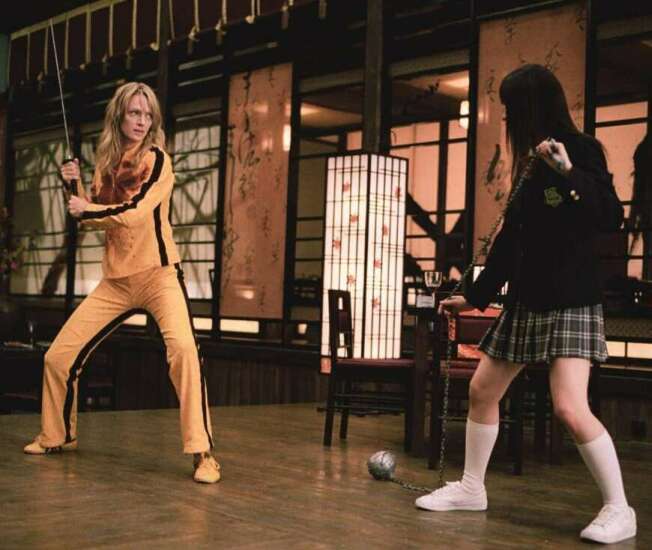 The trailers make this look as if it’s non-stop action, but it isn’t really – there are only a couple of proper set-pieces. The first (cinematically, if not chronologically for the characters) is between The Bride and Green, a brawl around the latter’s house. Despite imaginative use of kitchen utensils, the photography is all wrong, with way too many closeups, leaving it impossible to tell whether there’s any skill – or, indeed, what the hell is going on. I wouldn’t be surprised if this was one of the first things Tarantino shot, since it’s the kind of mistake you’d expect from someone like him, unfamiliar with shooting martial arts.
The trailers make this look as if it’s non-stop action, but it isn’t really – there are only a couple of proper set-pieces. The first (cinematically, if not chronologically for the characters) is between The Bride and Green, a brawl around the latter’s house. Despite imaginative use of kitchen utensils, the photography is all wrong, with way too many closeups, leaving it impossible to tell whether there’s any skill – or, indeed, what the hell is going on. I wouldn’t be surprised if this was one of the first things Tarantino shot, since it’s the kind of mistake you’d expect from someone like him, unfamiliar with shooting martial arts.
However, this is more than made up for with the lengthy sequence in Tokyo. In particular, the battle between The Bride and GoGo Yubari (Chiaki Kuriyama), the Japanese schoolgirl who is mistress of a weapon that can kill you in a dozen different ways. It’s a pity that the excruciating Japanese band, The 5678’s, who are playing in the venue, don’t get taken out as collateral damage. [Ten seconds of them is at least nine too many – they make Shonen Knife sound like the Vienna Philharmonic Orchestra] Regardless, much credit is due to Thurman, Kuriyama and fight co-ordinator Yuen Wo Ping for creating a fight which is simultaneously hard-hitting and original, as well as being aesthetically beautiful.
It’s difficult to give a comprehensive review to a film without an ending – indeed, we’re only half way through the story so far. But what we’ve seen so far beats up 2003’s other Hollywood action heroines, the lame Tomb Raider and Charlie’s Angels sequels, without even breaking a sweat. Roll on Volume 2 early next year, and I’ve a sneaking suspicion we’ll be heading back to see this one a few more times between now and then.
[Thanks to The Reel Truth for tickets to the advance screening of this movie.]
Dir: Quentin Tarantino
Stars: Uma Thurman, Lucy Liu, Sonny Chiba, Vivica A. Fox
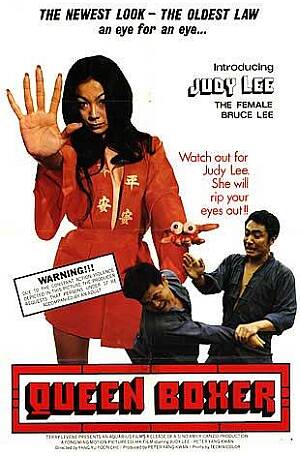 I have to say, this film would probably merit a higher score given a better presentation. Not only is the GoodTimes DVD barely VHS quality, dubbed and horribly cropped, the dialogue is missing from the right audio. Worst of all, the two tracks are out of sync, meaning that every punch is accompanied by a double sound effect. If there’s a more dreadful DVD in existence, I don’t want to see it: those responsible should suffer the fate depicted in the fabulous poster, shown on the right.
I have to say, this film would probably merit a higher score given a better presentation. Not only is the GoodTimes DVD barely VHS quality, dubbed and horribly cropped, the dialogue is missing from the right audio. Worst of all, the two tracks are out of sync, meaning that every punch is accompanied by a double sound effect. If there’s a more dreadful DVD in existence, I don’t want to see it: those responsible should suffer the fate depicted in the fabulous poster, shown on the right.




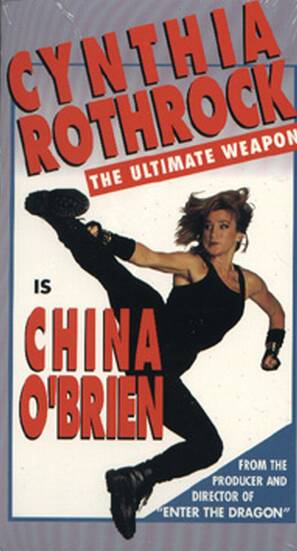 There’s something charmingly naive about this film. It inhabits, and expects us to believe in, a world where a villain can blow up the sheriff and his deputy with car-bombs, yet federal authorities take no interest. Nor do they apparently care when an election rally is machine-gunned. Mind you, in this same world, a new sheriff is elected five working days after the incumbent dies, but that’s still enough time for a massive parade down main street to be organised by a candidate.
There’s something charmingly naive about this film. It inhabits, and expects us to believe in, a world where a villain can blow up the sheriff and his deputy with car-bombs, yet federal authorities take no interest. Nor do they apparently care when an election rally is machine-gunned. Mind you, in this same world, a new sheriff is elected five working days after the incumbent dies, but that’s still enough time for a massive parade down main street to be organised by a candidate.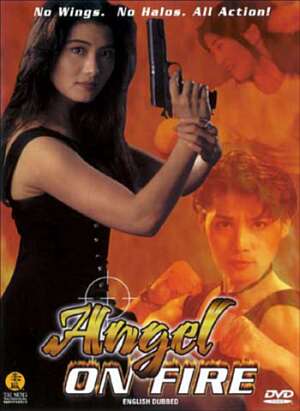 Supermodel-thief Mimi (Melanie Marquez) steals an artifact from a Chinese temple, then heads to the Philippines, via Hong Kong. HK and Chinese cops (Khan & Yeung) are on her tail, as is former partner Ko. This is, frankly, a mess. Yeung apparently does no detective work; Khan goes on a date to an illegal street fight; they’re supposedly partners, but only share one scene; and what
Supermodel-thief Mimi (Melanie Marquez) steals an artifact from a Chinese temple, then heads to the Philippines, via Hong Kong. HK and Chinese cops (Khan & Yeung) are on her tail, as is former partner Ko. This is, frankly, a mess. Yeung apparently does no detective work; Khan goes on a date to an illegal street fight; they’re supposedly partners, but only share one scene; and what 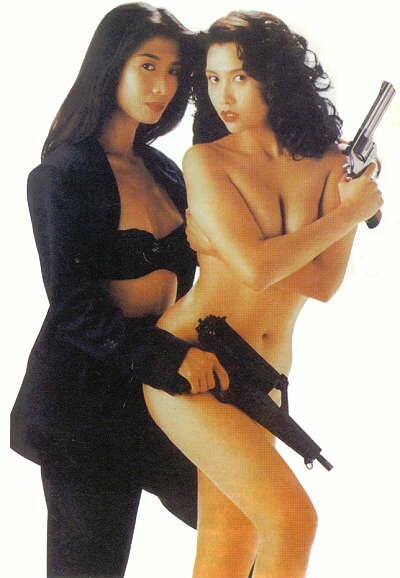
 Take a large helping of Basic Instinct, toss in some Nikita, and just a pinch of obscurer works such as Intimate Confessions of a Chinese Courtesan. Toss into the blender, and crank up to 11. The story concerns Kitty (Yau); when she goes to take revenge on the gangsters who killed her family, she crosses paths with Sister Cindy (Yao), a hitwoman who only takes out male scum. She saves Kitty and trains her as a new apprentice, despite the close attentions of cop Tinam (Yam), besotted with Kitty. He has a murky past, and throws up every time he holds a gun, since he accidentally shot his brother. Which isn’t good, especially when Cindy’s last apprentice, Princess (Ng) and her sidekick Baby (Svenvara Madoka) come back for tea and revenge…
Take a large helping of Basic Instinct, toss in some Nikita, and just a pinch of obscurer works such as Intimate Confessions of a Chinese Courtesan. Toss into the blender, and crank up to 11. The story concerns Kitty (Yau); when she goes to take revenge on the gangsters who killed her family, she crosses paths with Sister Cindy (Yao), a hitwoman who only takes out male scum. She saves Kitty and trains her as a new apprentice, despite the close attentions of cop Tinam (Yam), besotted with Kitty. He has a murky past, and throws up every time he holds a gun, since he accidentally shot his brother. Which isn’t good, especially when Cindy’s last apprentice, Princess (Ng) and her sidekick Baby (Svenvara Madoka) come back for tea and revenge… Ng, in particular, nails her part with a relish that’s just fabulous, but Kelly Yao also does surprisingly well – her role is perhaps the most pivotal in the plot, and she’s required to do more than look pretty, which she does with a maturity and confident poise that borders on the balletic. Yau is about the closest to a sympathetic character the film has, being largely the victim of unfortunate circumstances, while Yam has pretty much made a career out of playing the troubled cop, and could do this kind of job with his eyes shut. Indeed, given the vomiting required, he largely does.
Ng, in particular, nails her part with a relish that’s just fabulous, but Kelly Yao also does surprisingly well – her role is perhaps the most pivotal in the plot, and she’s required to do more than look pretty, which she does with a maturity and confident poise that borders on the balletic. Yau is about the closest to a sympathetic character the film has, being largely the victim of unfortunate circumstances, while Yam has pretty much made a career out of playing the troubled cop, and could do this kind of job with his eyes shut. Indeed, given the vomiting required, he largely does.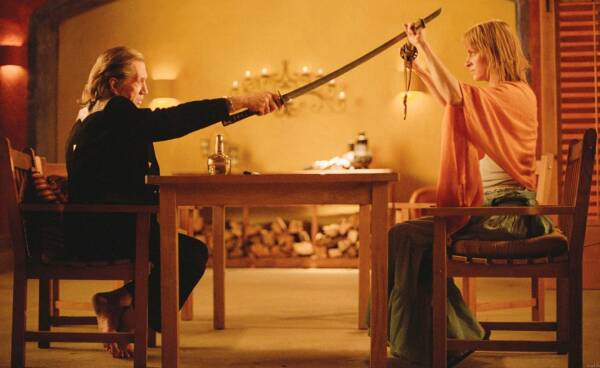 ★★★★
★★★★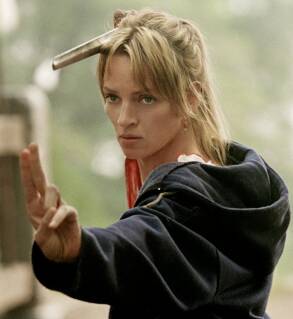 Precisely what, I’ll get to in a minute. But I also have to say that when this film works, it does so extremely well, with moments – and a good number of more lengthy sequences – that are just about perfect. We learn why Elle Driver (Hannah) has only one eye; the relationship between Budd (Madsen) and Bill (Carradine); the reason the Bride quit her life as an international jet-setting killer; and how the Crazy 88’s didn’t actually have 88 members. All these elements are dealt with swiftly and efficiently, plugged in like jigsaw pieces in their correct place, so it’s not as if Tarantino
Precisely what, I’ll get to in a minute. But I also have to say that when this film works, it does so extremely well, with moments – and a good number of more lengthy sequences – that are just about perfect. We learn why Elle Driver (Hannah) has only one eye; the relationship between Budd (Madsen) and Bill (Carradine); the reason the Bride quit her life as an international jet-setting killer; and how the Crazy 88’s didn’t actually have 88 members. All these elements are dealt with swiftly and efficiently, plugged in like jigsaw pieces in their correct place, so it’s not as if Tarantino  But when Tarantino just nods to other movies, rather than waving them in the air and shouting “Look at me! Amn’t I
But when Tarantino just nods to other movies, rather than waving them in the air and shouting “Look at me! Amn’t I 












 There is also the nasty question of how much of what is praiseworthy, is actually Quentin’s own work. If you’ve seen the infamous Who Do You Think You’re Fooling?, which intercuts clips from Reservoir Dogs with very similar scenes from a Hong Kong movie made several years previously, City on Fire, you’ll know what I mean. I’d rather praise film-makers such as David Cronenberg, who do more than cobble together pieces “borrowed” from other people, no matter how amusingly post-modern the results may be.
There is also the nasty question of how much of what is praiseworthy, is actually Quentin’s own work. If you’ve seen the infamous Who Do You Think You’re Fooling?, which intercuts clips from Reservoir Dogs with very similar scenes from a Hong Kong movie made several years previously, City on Fire, you’ll know what I mean. I’d rather praise film-makers such as David Cronenberg, who do more than cobble together pieces “borrowed” from other people, no matter how amusingly post-modern the results may be. Uma Thurman is The Bride – her character is never named (it’s given a couple of times, but beeped out) – a member of the Deadly Vipers Assassination squad operating under the eye of Bill (David Carradine, not yet seen). When she tries to quit, her marriage is interrupted by the rest of the team, who kill the groom, the priest and even the guy playing the organ. They think they’ve killed the pregnant bride. They’re wrong.
Uma Thurman is The Bride – her character is never named (it’s given a couple of times, but beeped out) – a member of the Deadly Vipers Assassination squad operating under the eye of Bill (David Carradine, not yet seen). When she tries to quit, her marriage is interrupted by the rest of the team, who kill the groom, the priest and even the guy playing the organ. They think they’ve killed the pregnant bride. They’re wrong.



 The trailers make this look as if it’s non-stop action, but it isn’t really – there are only a couple of proper set-pieces. The first (cinematically, if not chronologically for the characters) is between The Bride and Green, a brawl around the latter’s house. Despite imaginative use of kitchen utensils, the photography is all wrong, with way too many closeups, leaving it impossible to tell whether there’s any skill – or, indeed, what the hell is going on. I wouldn’t be surprised if this was one of the first things Tarantino shot, since it’s the kind of mistake you’d expect from someone like him, unfamiliar with shooting martial arts.
The trailers make this look as if it’s non-stop action, but it isn’t really – there are only a couple of proper set-pieces. The first (cinematically, if not chronologically for the characters) is between The Bride and Green, a brawl around the latter’s house. Despite imaginative use of kitchen utensils, the photography is all wrong, with way too many closeups, leaving it impossible to tell whether there’s any skill – or, indeed, what the hell is going on. I wouldn’t be surprised if this was one of the first things Tarantino shot, since it’s the kind of mistake you’d expect from someone like him, unfamiliar with shooting martial arts.





















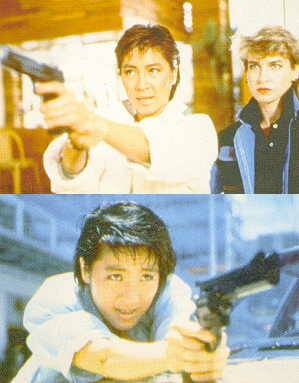 Purely on a historical level, this 1985 film merits attention since it started the whole action-heroine genre in Hong Kong cinema, which thrived for the next decade, producing some of the finest entries ever made. It also was, effectively, the start of the careers of Michelle Yeoh and Cynthia Rothrock. Interesting to see how they’ve since headed in opposite directions: Rothrock to low-budget erotic thrillers, Yeoh to the Academy Awards.
Purely on a historical level, this 1985 film merits attention since it started the whole action-heroine genre in Hong Kong cinema, which thrived for the next decade, producing some of the finest entries ever made. It also was, effectively, the start of the careers of Michelle Yeoh and Cynthia Rothrock. Interesting to see how they’ve since headed in opposite directions: Rothrock to low-budget erotic thrillers, Yeoh to the Academy Awards.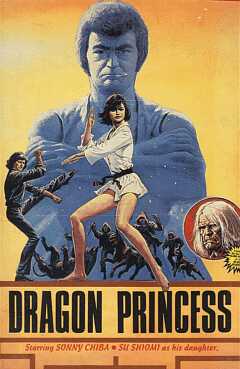 If ever a movie was condemned by the medium, this is it – it’s badly dubbed, cropped to oblivion, and the print looks as if it has recently been used as kitty litter. Just what DVD was invented for… Plotwise, there’s certainly nothing new. Shiomi plays the daughter of a kung-fu master (Chiba) who was crippled by his rival (Ishabashi) in a spat over a job. He retires to New York to plot revenge, using his daughter as his weapon. After the traditional, getting-beaten-up-repeatedly training, she returns to Japan, wastes no time in making a nuisance of herself and everything heads relentlessly towards the big showdown.
If ever a movie was condemned by the medium, this is it – it’s badly dubbed, cropped to oblivion, and the print looks as if it has recently been used as kitty litter. Just what DVD was invented for… Plotwise, there’s certainly nothing new. Shiomi plays the daughter of a kung-fu master (Chiba) who was crippled by his rival (Ishabashi) in a spat over a job. He retires to New York to plot revenge, using his daughter as his weapon. After the traditional, getting-beaten-up-repeatedly training, she returns to Japan, wastes no time in making a nuisance of herself and everything heads relentlessly towards the big showdown.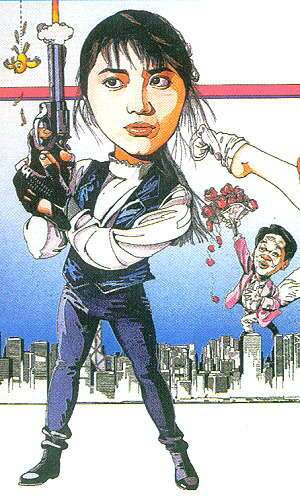 I have a headache. I want to lie down in a dark room, far from shrieking Chinese comedy harridans, incomprehensible plot twists and dialogue that loses
I have a headache. I want to lie down in a dark room, far from shrieking Chinese comedy harridans, incomprehensible plot twists and dialogue that loses  Yeoh’s English-language follow-up to Crouching Tiger was highly anticipated, but the end result is a disappointment. Yeoh plays Yin, the head of a family of acrobats who guard part of the key to a Sharira – a holy relic with potential for good or evil. The latter is supplied by Carl (Roxburgh), who hires Yin’s former boyfriend Eric (Chaplin) to steal the other elements needed to get the Sharira. Eric, however, switches sides, and teams up with Yin to race Carl to the prize.
Yeoh’s English-language follow-up to Crouching Tiger was highly anticipated, but the end result is a disappointment. Yeoh plays Yin, the head of a family of acrobats who guard part of the key to a Sharira – a holy relic with potential for good or evil. The latter is supplied by Carl (Roxburgh), who hires Yin’s former boyfriend Eric (Chaplin) to steal the other elements needed to get the Sharira. Eric, however, switches sides, and teams up with Yin to race Carl to the prize.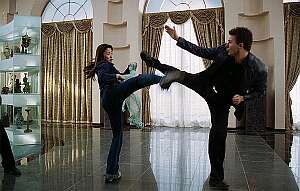 Worst of all, given a $20m budget, you’d think the climax would be more than extremely lame CGI, barely worthy of a Playstation game. Yeoh is her own best special effect, and the finale gives her little or no chance to shine. I suspect she’d have been better off taking a part in the Matrix sequels, which she turned down in order to make this mediocre action-adventure entry. Little wonder Miramax pushed the US release back to Spring 2004 – almost two years after the HK release. Do not be surprised if it quietly gets dumped to video.
Worst of all, given a $20m budget, you’d think the climax would be more than extremely lame CGI, barely worthy of a Playstation game. Yeoh is her own best special effect, and the finale gives her little or no chance to shine. I suspect she’d have been better off taking a part in the Matrix sequels, which she turned down in order to make this mediocre action-adventure entry. Little wonder Miramax pushed the US release back to Spring 2004 – almost two years after the HK release. Do not be surprised if it quietly gets dumped to video.